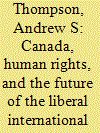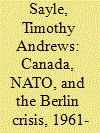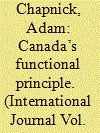| Srl | Item |
| 1 |
ID:
134622


|
|
|
|
|
| Summary/Abstract |
Initially, recognition of the vital role played by regional diplomacy did not accompany NATO’s substantial commitment to economic and political development in Afghanistan from 2001 to 2014. Pakistan in particular had a major influence on the conduct of reconstruction efforts and NATO’s efforts to lay the institutional foundations in Afghanistan. Canada, an early and committed participant in the International Security Assistance Force, would by 2005 come to recognise the vital importance of the role of Pakistan in the outcome of the mission. However, regional limits to the influence of the United States, the North Atlantic Treaty Organisation, and Canada made comprehensive efforts unattainable.
|
|
|
|
|
|
|
|
|
|
|
|
|
|
|
|
| 2 |
ID:
160804


|
|
|
|
|
| Summary/Abstract |
Human rights—specifically international human rights law—have been central to the success of the liberal international order. But since the founding of the United Nations (UN), Canada has had a complicated relationship with international human rights law. This article provides a survey of sixty years of Canadian human rights diplomacy at the UN Commission on Human Rights, from its establishment in 1946 to its dissolution in 2006. During this period, there were moments when Canada did champion new international law, and did so courageously. Yet there were others, such as during negotiations to recognize and codify the rights of Indigenous peoples, when it stood in the way of progress. But the international order that has served Canada so well since the end of the Second World War is under threat, due to a combination of shifts in the global balance of power, and critical challenges such as climate change. If it is to survive into the twenty-first century, advanced democracies such as Canada will need to lead in the development and enforcement of international human rights law, a role that governments in Ottawa have at various times been reluctant to play.
|
|
|
|
|
|
|
|
|
|
|
|
|
|
|
|
| 3 |
ID:
124411


|
|
|
|
|
| Publication |
2013.
|
| Summary/Abstract |
Historians of Canadian foreign affairs have argued that Canada played an important role in influencing allied policy during the Berlin Crisis of 1961-1962. Newly declassified documents reveal the opposite. Canada opposed much of the North Atlantic Treaty Organization (NATO) contingency planning during the crisis, especially plans calling for the demonstrative use of nuclear weapons. Despite Canada's efforts to modify NATO's Berlin Contingency plans (BERCONs), Canadian diplomats found themselves isolated in the North Atlantic Council (NAC) and accepted plans they considered to be dangerous. Canada had no significant influence on NATO military planning during one of the most serious crises of the Cold War.
|
|
|
|
|
|
|
|
|
|
|
|
|
|
|
|
| 4 |
ID:
154645


|
|
|
|
|
| Summary/Abstract |
On 29 March 2016, in a speech at the University of Ottawa, Stéphane Dion outlined “the guiding principle” that he intended to follow as the Trudeau government’s first minister of global affairs. He called it “responsible conviction”: an approach to policymaking that combined the need to balance his personal sense of right and wrong with a pragmatic understanding of the consequences of Ottawa’s policy choices. The decision to announce Canada’s new global posture so publicly recalls the conduct of the Canadian foreign policy establishment during the Second World War, when Ottawa first proclaimed its allegiance to another decision-making framework: the functional principle. This brief essay reviews the history and utility of the Canadian version of functionalism with an eye to drawing lessons for Minister Dion’s successor, Chrystia Freeland, and her contemporaries. Understanding the ultimate plight of the functional principle might make the new minister less adamant about placing responsible conviction at the centre of her foreign policy platform.
|
|
|
|
|
|
|
|
|
|
|
|
|
|
|
|